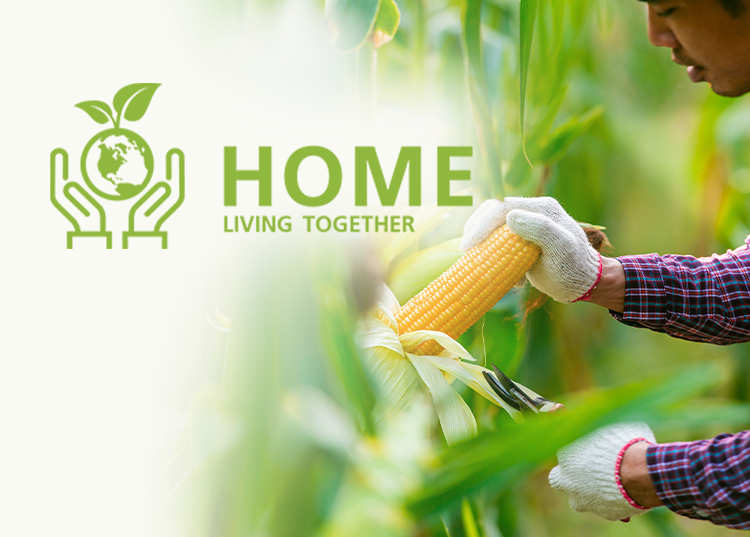We recognize that the strength of a chain also depends on the least strong chain link. For this reason, the company has taken part in Strengthen the strength of business partners throughout the supply chain to strive for excellence in all dimensions, economic, social and environmental aspects.
The company poses a great challenge in the drive to bring about positive change, such limitations do not stop the company or give up but on the other hand. To develop the potential of our business partners for the better, we will think together to build towards sustainability at the same time. In addition, the company also supports the Sustainable Development Goals to develop the countries in which the Company has operated or Invest in 3 benefits.
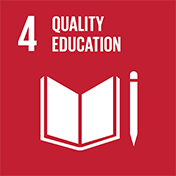
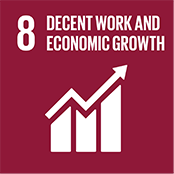
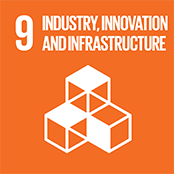

Code of Conduct
communicated.

group have assessed and identified
Critical Suppliers.
-
Number of businesses assessed and identified by key business partners3677100%
-
Percentage of business partners communicated with Ethics Handbook–98.50100100100%
At CP Intertrade , we have integrated sustainability issues into our procurement process and operate under the Responsible Supply Chain Management Framework. We encourage our suppliers to adhere to the CP Intertrade Code of Conduct in order to foster mutual sustainable growth and create added value for the
business across our entire supply chain and for a wide range of stakeholders. Furthermore, to bring about transformative growth, and to support CP Intertrade’s businesses around the world, we also developed a sustainability risk assessment tool using information technology, which enables us to identify opportunities for improvement and lay down proactive supply chain management measures through partnerships between the Group and our suppliers.
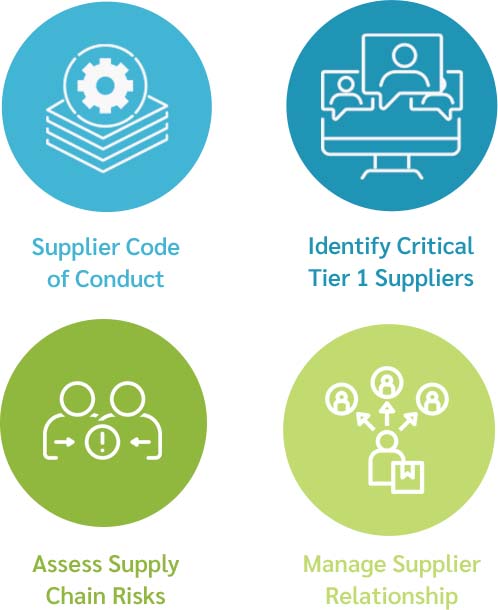
Risk Exposure Supplier Sustainability Assessment
Given that C.P. Intertrade’s business involves a great number of suppliers, we begin our approach to responsible supply chain management by first working with critical suppliers. Here, critical suppliers are classified according to the following criteria:
- high procurement value;
- suppliers of critical raw materials/components
- suppliers of non-substitutable raw materials/components, or limited numbers of suppliers who are able to deliver on the requirements.
Additionally, we identify high-risk suppliers by conducting a sustainability risk assessment across the entire supply chain, using evaluation criteria in two dimensions: severity of impact and likelihood of risk. Risk factors included in the assessment come from reputable sources, namely: 1) news; 2) past performance; 3) industry-relevant risk factors; and 4) future emerging risk trends. C.P. Intertrade’s risk assessment covers suppliers of raw materials, packaging, and services, and are not only limited to tier 1 suppliers or those with direct purchasing relationships with the Group), but also include non-tier 1 suppliers as well.
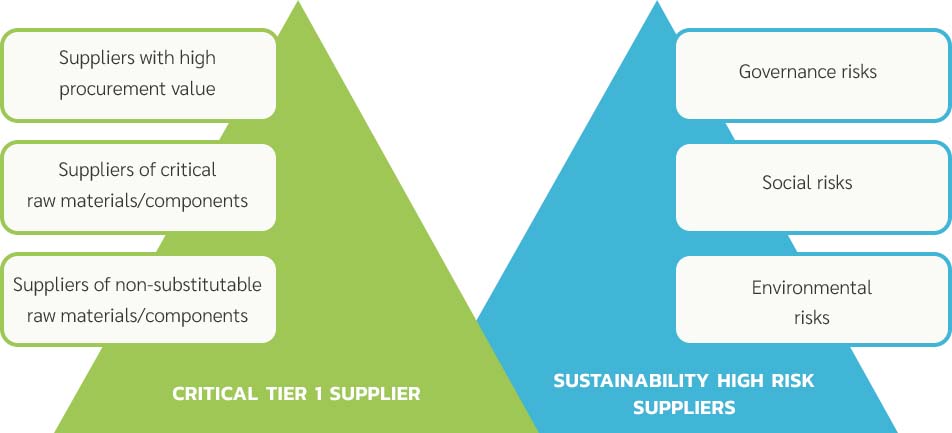
Our business strives to enhance the capabilities of our suppliers in various key areas, including safe and sustainable production practices.
This is achieved through a management system that ensures proper planning and continuous improvements, creates learning networks, adopts digital technologies, and supports marketing to enhance the value and capabilities of suppliers to achieve sustainable business operations.
-
Knowledge
Sharing
- Using resources efficiently
- Food safety
- Occupational health and safety
- Sustainability principles
-
Management System

- Good Agricultural Practices (GAP)
- Good Manufacturing Practices
- (GMP) for food
- Traceability system
-
Increasing Value

- Product development
- Increasing efficiency
- Using modern agricultural tools
- Identifying production inputs using theoretical principles
-
Synergy

- Building learning networks
- Joining forces with the public sector
- Sharing experiences and best practices
- Creating agricultural equipment networks to reduce costs
-
Digital Technology

- Using digital platforms to develop cultivation plans
- Creating communication and learning channels
- Registering farmers
- Receiving recommendations and complaints
-
Marketing/ Finance

- Setting fair prices
- Guaranteeing Product price buyback
- Planning production based on actual market needs
- Promoting credit
Management Goals
-
Identifying
key business partners &
other high-ranking
partners -
Communicating
sustainability issues
to partners -
Key Partner
Sustainability
Self-Assessment
Sustainability issues are included as part of the selection of suppliers. starting from the selection process of new partners to the evaluation of partners to maintain the status of a partner Sustainability performance of business partners is considered through methods appropriate to the business, such as self-assessment. Audits performed by companies within the business group or a trusted third party based on international sustainability standards such as ISO 14001, ISO 45001, and Supplier Ethic Data Exchange (SEDEX). The objective is to find opportunities to improve and proactively formulate management standards for coordination between partners and business groups.
We recognize that the strength of a chain also depends on the least strong chain link. For this reason, the company has taken part in Strengthen the strength of business partners throughout the supply chain to strive for excellence in all dimensions, economic, social and environmental aspects.
The company poses a great challenge in the drive to bring about positive change, such limitations do not stop the company or give up but on the other hand. To develop the potential of our business partners for the better, we will think together to build towards sustainability at the same time. In addition, the company also supports the Sustainable Development Goals to develop the countries in which the Company has operated or Invest in 3 benefits.




Code of Conduct
communicated.

group have assessed and identified
Critical Suppliers.
-
Number of businesses assessed and identified by key business partners3677100%
-
Percentage of business partners communicated with Ethics Handbook–98.50100100100%
At CP Intertrade , we have integrated sustainability issues into our procurement process and operate under the Responsible Supply Chain Management Framework. We encourage our suppliers to adhere to the CP Intertrade Code of Conduct in order to foster mutual sustainable growth and create added value for the
business across our entire supply chain and for a wide range of stakeholders. Furthermore, to bring about transformative growth, and to support CP Intertrade’s businesses around the world, we also developed a sustainability risk assessment tool using information technology, which enables us to identify opportunities for improvement and lay down proactive supply chain management measures through partnerships between the Group and our suppliers.

Risk Exposure Supplier Sustainability Assessment
Given that C.P. Intertrade’s business involves a great number of suppliers, we begin our approach to responsible supply chain management by first working with critical suppliers. Here, critical suppliers are classified according to the following criteria:
- high procurement value;
- suppliers of critical raw materials/components
- suppliers of non-substitutable raw materials/components, or limited numbers of suppliers who are able to deliver on the requirements.
Additionally, we identify high-risk suppliers by conducting a sustainability risk assessment across the entire supply chain, using evaluation criteria in two dimensions: severity of impact and likelihood of risk. Risk factors included in the assessment come from reputable sources, namely: 1) news; 2) past performance; 3) industry-relevant risk factors; and 4) future emerging risk trends. C.P. Intertrade’s risk assessment covers suppliers of raw materials, packaging, and services, and are not only limited to tier 1 suppliers or those with direct purchasing relationships with the Group), but also include non-tier 1 suppliers as well.

Our business strives to enhance the capabilities of our suppliers in various key areas, including safe and sustainable production practices.
This is achieved through a management system that ensures proper planning and continuous improvements, creates learning networks, adopts digital technologies, and supports marketing to enhance the value and capabilities of suppliers to achieve sustainable business operations.
-
Knowledge
Sharing
- Using resources efficiently
- Food safety
- Occupational health and safety
- Sustainability principles
-
Management System

- Good Agricultural Practices (GAP)
- Good Manufacturing Practices
- (GMP) for food
- Traceability system
-
Increasing Value

- Product development
- Increasing efficiency
- Using modern agricultural tools
- Identifying production inputs using theoretical principles
-
Synergy

- Building learning networks
- Joining forces with the public sector
- Sharing experiences and best practices
- Creating agricultural equipment networks to reduce costs
-
Digital Technology

- Using digital platforms to develop cultivation plans
- Creating communication and learning channels
- Registering farmers
- Receiving recommendations and complaints
-
Marketing/ Finance

- Setting fair prices
- Guaranteeing Product price buyback
- Planning production based on actual market needs
- Promoting credit
Management Goals
-
Identifying
key business partners &
other high-ranking
partners -
Communicating
sustainability issues
to partners -
Key Partner
Sustainability
Self-Assessment
Sustainability issues are included as part of the selection of suppliers. starting from the selection process of new partners to the evaluation of partners to maintain the status of a partner Sustainability performance of business partners is considered through methods appropriate to the business, such as self-assessment. Audits performed by companies within the business group or a trusted third party based on international sustainability standards such as ISO 14001, ISO 45001, and Supplier Ethic Data Exchange (SEDEX). The objective is to find opportunities to improve and proactively formulate management standards for coordination between partners and business groups.





